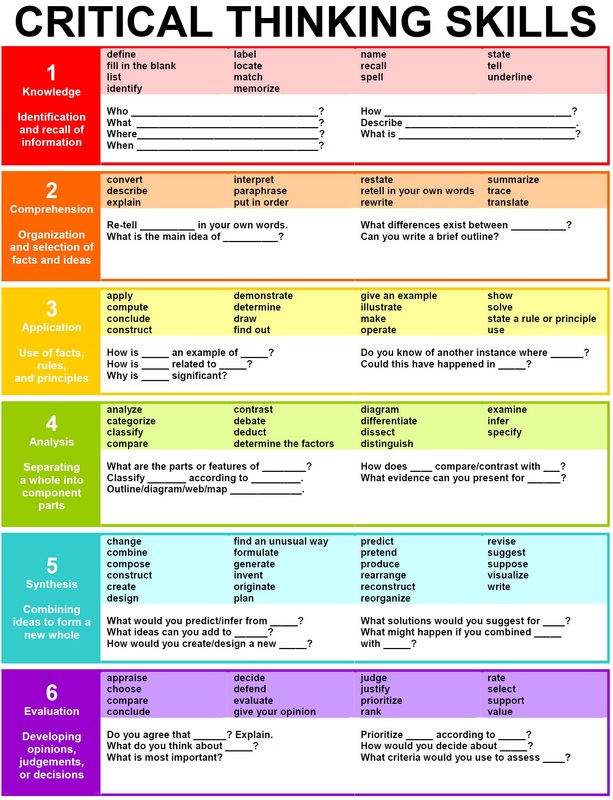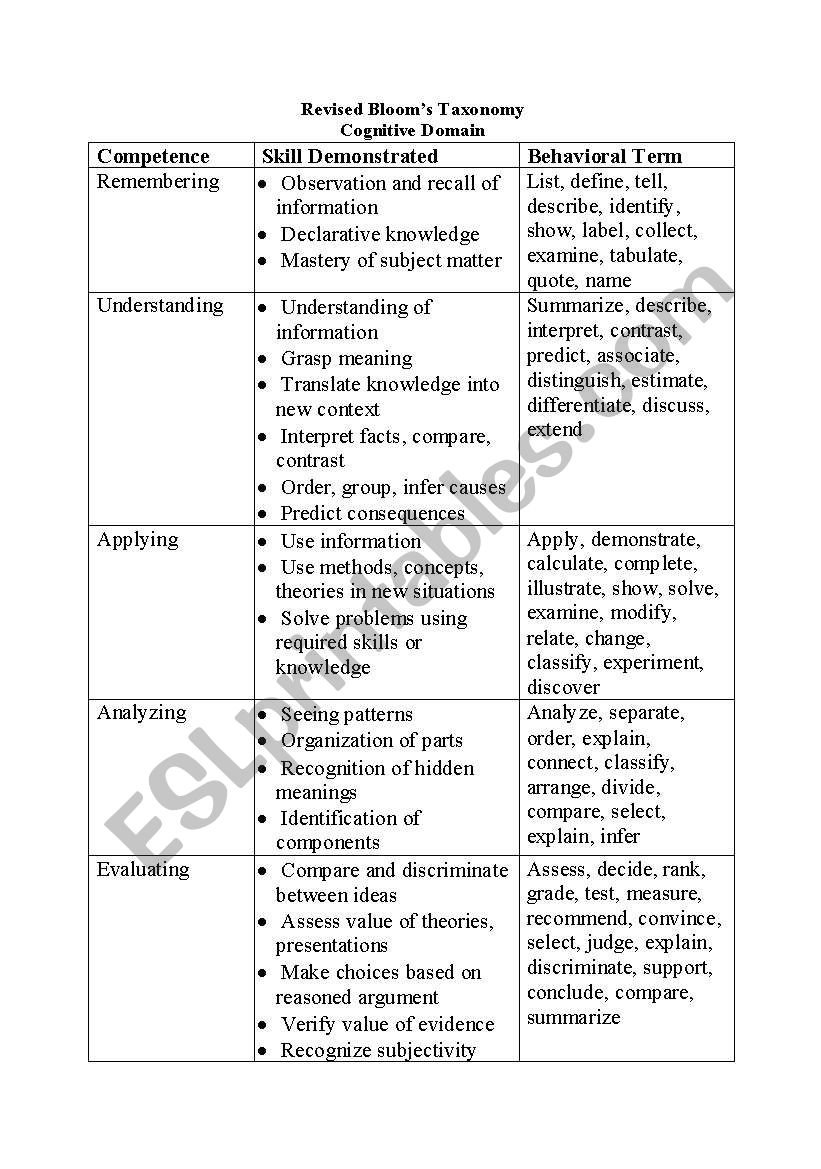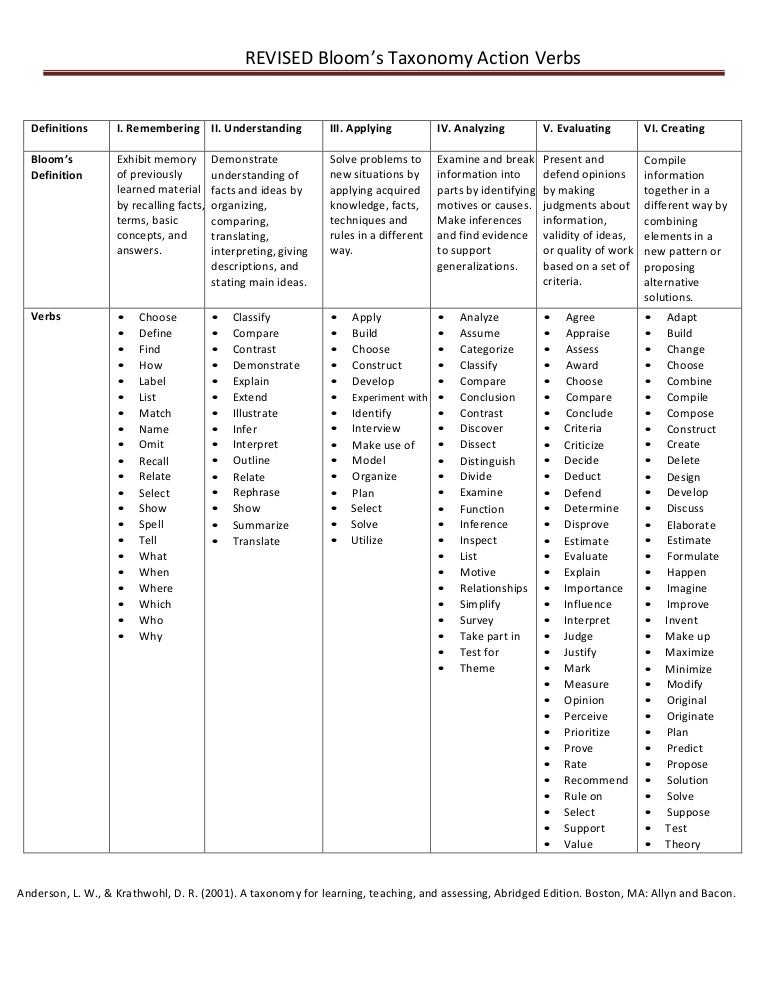Bloom's Taxonomy Worksheet
Bloom's Taxonomy Worksheet - The theory is based upon the idea that there are levels of observable actions that indicate something is happening in the brain (cognitive activity.) A taxonomy for learning, teaching, and assessing: Considers organelle structures and functions, including nucleus, rer, ser, lysosomes, golgi apparatus, cell membrane and centrioles. A revision of bloom's taxonomy of educational objectives. For assistance, please contact cet. Web bloom’s taxonomy worksheet answer sheet an important thing to remember is that the meaning of words is contextual. Web bloom’s taxonomy is a very useful classification model for learning objectives. Refer to the chart when composing course learning objectives and selecting appropriate assessment types. It was first proposed by benjamin bloom in 1956 and slightly revised in 2001. This product contains 6 different posters for each level of bloom's taxonomy. Knowledge, comprehension, application, analysis, synthesis, and evaluation. A taxonomy for learning, teaching, and assessing: On each poster there is a list of the common verbs that are associated with each level of thinking. _____ knowledge observation and recall information • knowledge of dates, events, places • knowledge of major ideas arrange, define, duplicate, label, list, memorize, name, order, recognize, relate,. Resources provided include display posters, question/sentence starter cards, and fast finisher task cards. Iupui center of teaching and learning. This product contains 6 different posters for each level of bloom's taxonomy. N bloom’s revised taxonomy worksheet cognitive process dimension 1 remember recognizing or recalling knowledge, facts or. _____ knowledge observation and recall information • knowledge of dates, events, places •. For assistance, please contact cet. Web developed by lisa o’reilly, ma. _____ knowledge observation and recall information • knowledge of dates, events, places • knowledge of major ideas arrange, define, duplicate, label, list, memorize, name, order, recognize, relate, recall, Add to my workbooks (0) The theory is based upon the idea that there are levels of observable actions that indicate. This product contains 6 different posters for each level of bloom's taxonomy. Students can use this learning tool to develop questioning strategies for each of the six (recently updated) levels of bloom’s taxonomy. Web center for student success bloom’s taxonomy bloom’s taxonomy is a hierarchy of methods for learning information. Web comprehension to show understanding finding in‐ formation from the. Lower level skills higher level skills based on “blooms. How do i use it? The framework elaborated by bloom and his collaborators consisted of six major categories: Web bloom’s taxonomy question creation worksheet competence skill demonstrated objective verbs topic: Web worksheet classifying comparing exemplifying explaining inferring interpreting paraphrasing summarizing collection examples explanation label list outline. A revision of bloom's taxonomy of educational objectives. Another thing worth thinking about is learners’ prior knowledge and experience. Web by keeping these question stems at your fingertips, the ability to practice thinking critically is always available!revised blooms taxonomy questions stems are designed for a key ring. Web cet.usc.edu bloom’s taxonomy what is this resource? N bloom’s revised taxonomy worksheet. Web cet.usc.edu bloom’s taxonomy what is this resource? The theory is based upon the idea that there are levels of observable actions that indicate something is happening in the brain (cognitive activity.) O we achieve higher levels by mastering lower levels. Based on anderson, l.w., & krathwohl (eds.). Bloom’s taxonomy organizes learning objectives according to the type of learning that. Resources provided include display posters, question/sentence starter cards, and fast finisher task cards. Web worksheet with questions clearly organised in ascending order based on bloom's taxonomy. Add to my workbooks (0) Web bloom's taxonomythe activity is for methodology classes. N bloom’s revised taxonomy worksheet cognitive process dimension 1 remember recognizing or recalling knowledge, facts or. For assistance, please contact cet. Web worksheet classifying comparing exemplifying explaining inferring interpreting paraphrasing summarizing collection examples explanation label list outline. Students can use this learning tool to develop questioning strategies for each of the six (recently updated) levels of bloom’s taxonomy. Explain the flow of learning. An introduction to bloom’s taxonomy and its use in designing course learning objectives. Most popular first newest first. Web bloom’s taxonomy worksheet answer sheet an important thing to remember is that the meaning of words is contextual. Another thing worth thinking about is learners’ prior knowledge and experience. The framework elaborated by bloom and his collaborators consisted of six major categories: A taxonomy for learning, teaching, and assessing: Add to my workbooks (0) Web benjamin bloom created a taxonomy of measurable verbs to help us describe and classify observable knowledge, skills, attitudes, behaviors and abilities. Web bloom’s taxonomy question creation worksheet competence skill demonstrated objective verbs topic: A taxonomy for learning, teaching, and assessing: Knowledge, comprehension, application, analysis, synthesis, and evaluation. The theory is based upon the idea that there are levels of observable actions that indicate something is happening in the brain (cognitive activity.) Web developed by lisa o’reilly, ma. Web in 1956, benjamin bloom with collaborators max englehart, edward furst, walter hill, and david krathwohl published a framework for categorizing educational goals: This product contains 6 different posters for each level of bloom's taxonomy. O we achieve higher levels by mastering lower levels. Resources provided include display posters, question/sentence starter cards, and fast finisher task cards. The three lists cover the learning objectives in cognitive, affective and psychomotor domains. An introduction to bloom’s taxonomy and its use in designing course learning objectives and assessments. Most popular first newest first. Web bloom's taxonomythe activity is for methodology classes. Web worksheet classifying comparing exemplifying explaining inferring interpreting paraphrasing summarizing collection examples explanation label list outline. A revision of bloom's taxonomy of educational objectives. Another thing worth thinking about is learners’ prior knowledge and experience. Demonstrating basic understanding of facts and ideas. On each poster there is a visual to show the students how much brain power it requires to answer questions with the given verbs. A taxonomy for learning, teaching, and assessing: Web center for student success bloom’s taxonomy bloom’s taxonomy is a hierarchy of methods for learning information. On each poster there is a list of the common verbs that are associated with each level of thinking. Bloom’s taxonomy “revised” key words, model questions, & instructional strategies. Web worksheet classifying comparing exemplifying explaining inferring interpreting paraphrasing summarizing collection examples explanation label list outline. Based on anderson, l.w., & krathwohl (eds.). Considers organelle structures and functions, including nucleus, rer, ser, lysosomes, golgi apparatus, cell membrane and centrioles. N bloom’s revised taxonomy worksheet cognitive process dimension 1 remember recognizing or recalling knowledge, facts or. Most popular first newest first. On each poster there is a visual to show the students how much brain power it requires to answer questions with the given verbs. The framework elaborated by bloom and his collaborators consisted of six major categories: Add to my workbooks (0) Web comprehension to show understanding finding in‐ formation from the text. So the way you use a verb will impact learners’ interpretation of what you want them to do. Web benjamin bloom created a taxonomy of measurable verbs to help us describe and classify observable knowledge, skills, attitudes, behaviors and abilities. Resources provided include display posters, question/sentence starter cards, and fast finisher task cards.Bloom's Taxonomy the coaching spot
English worksheets Revised Blooms taxonomy
BLOOM'S TAXONOMY VERBS Print this handy reference sheet. (This link
MULTIPLE INTELLIGENCES _ BLOOM S TAXONOMY Multiple intelligences
BloomsTaxonomy Teacher Planning Kit The 21s... Teacher planning
Blooms taxonomy action_verbs revised
Pin page
Pin on Work
Richard D. Solomon's Blog on Mentoring Jewish Students and Teachers
Pin on literature guides
Web Bloom’s Taxonomy Worksheet Answer Sheet An Important Thing To Remember Is That The Meaning Of Words Is Contextual.
Another Thing Worth Thinking About Is Learners’ Prior Knowledge And Experience.
The Three Lists Cover The Learning Objectives In Cognitive, Affective And Psychomotor Domains.
Demonstrating Basic Understanding Of Facts And Ideas.
Related Post:










